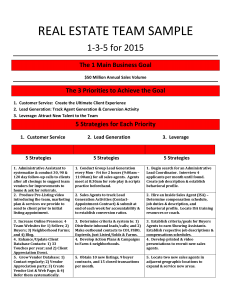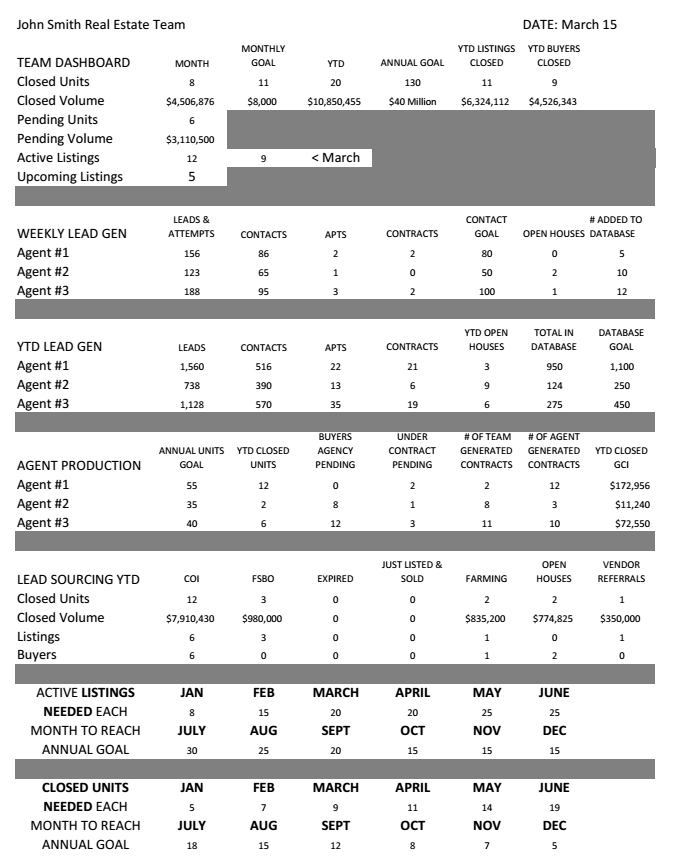Use these real estate team meeting agenda ideas to create a positive culture of growth and skill development within the members of a real estate team. Teams that want to increase production understand the importance of carving out time for income producing activities. Similarly, they realize that tracking these activities is crucial for accountability, motivation and development. Teams that experience difficulty with growth often focus solely on business servicing activities, leaving no time or focus on business generation efforts. These are busy teams, not productive ones. In turn, this puts a lid on their growth which causes significant problems with team morale. Growing organizations are healthy organizations, and successful teams understand that focusing on growth must start with their weekly real estate team meeting agenda. Before examining our real estate team meeting agenda ideas below, watch as we explain the elements of a productive team meeting agenda in this video. See our article on Inman about onboarding agents using our free agent onboarding calendar.
Real Estate Team Meeting Agenda Items
 1. Emotional Capital Introduction
1. Emotional Capital Introduction
This icebreaker gets everyone on the team engaged as each team member checks in with the group by briefly telling everyone else what has been going on in their lives over the past week and how they are doing. This also serves to bring team members closer together over time. Whether it be personal or business updates that are shared, this emotional capital item provides a forum for everyone to speak and be heard.
2. Business Activity Log
A quick run through of 1. Active Listings; 2. Pending Contracts; 3. Buyers w/ Signed Exclusive Agency Agreements; 4. Upcoming Listings; and 5. Upcoming Closings. This information should all be displayed on a spreadsheet or team activity log for everyone to review, update and ensure its accuracy.
3. Sales Agent Updates
Each member of the team should be listed as a separate item on the real estate team meeting agenda in order to review their business generation activities in front of the group. For example, buyer’s agents might report their 1. Lead Generation Contacts; 2. Buyer Consultation Appointments; 3. Buyer Agency Agreements Signed; 4. Pending Contracts; and 5. Closings. They also should compare these numbers to their weekly, monthly and year-to-date goals as they report. Listing Specialists, Showing Assistants and Inside Sales Agents (ISAs) also report their income producing activities in a similar fashion. To further enhance accountability, all of these numbers should also be inputted by each of the agents a day or two prior to the meeting so that they can be displayed to everyone at the meeting on a team scoreboard like the example shown below:
 4. Administrative Updates
4. Administrative Updates
Position by position, each administrative staff member reports on their progress on developing systems, marketing activities, and other annual business plan items that the team wants to accomplish over the course of the year. Please also feel free to click on the image to the left to enlarge a copy of our sample annual real estate team business plan, or learn how to create a quick team business plan by clicking here. The Administrative Manger, Transaction Coordinator, Marketing Director and Listing Manager should all report as well. Please note that these updates should not include any information pertaining to active listings or transactions. This meeting represents the one hour per week that the team focuses on growth and generating new business together. The rest of the week is available for handling issues with pending transactions and etc., so it is crucial to protect this time.
5. Mokitas
As referenced in the book Fierce Conversations by Susan Scott, the word “mokita” refers to an issue or problem that remains unspoken but is simmering under the surface just waiting to come to a boil at some point in the future. It is important to get these issues out in the open and discussed before they turn into larger problems with serious consequences later. It is tough to work with elephants in the room, so be sure to allow a safe environment where team members are encouraged to communicate problems and reveal any issues they may have involving anyone else on the team. Although you will typically run through this agenda item since no one will have anything to discuss, just having this item on the real estate team meeting agenda leaves no excuse for bad attitudes, drama or backbiting.
6. Growth & Development
A real estate team that is truly growth orientated makes time to focus on learning based activities. Here the team plans and discusses any upcoming training classes, conferences or team building events they might attend. Senior members of the team might schedule one-on-one coaching appointments or role-play sessions with other team members to help speed up learning curves. Again, just having this on the real estate team meeting agenda focuses everyone on their own growth. It sets the tone that the team does not just provide leads and income to it’s members. It demonstrates an expectation that they will improve themselves as well.
Pre-Listing Package Contents & Strategies
Real Estate Transaction Coordinator Job Description
Listing Presentation Scripts & Dialogues
Top 10 Real Estate Farming Ideas
Lead Follow Up Scripts & Methods
Open House Guest Lists – Scripts to Get Them Filled Out
Ways to Grow a Real Estate COI Quickly
Inside Sales Agents on Real Estate Teams
REALTOR Database Contact Plans & Scripts
Realtor Vendor Databases: Scripts & Lists to Build Them
The One Page Real Estate Business Plan
How to Transfer Facebook Friends to your Client Database
A Real Estate Administrative Assistant’s Job Description
FSBO Prospecting Scripts & Objection Handlers
Open House Scripts to Generate New Listings
Scripts for Buyers: How to Show Less Homes
Just Listed & Just Sold Real Estate Scripts
What to Say When Calling FSBO Sellers for Listings
Managing & Compensating Buyer’s Agents on Real Estate Teams
Easy Ways to Ask Your Clients for Referrals




















